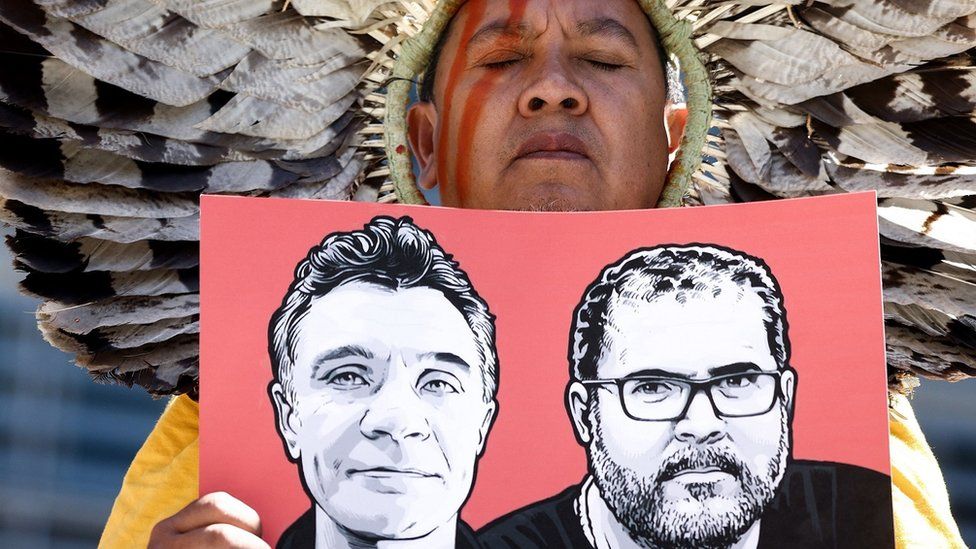Dom Phillips and Bruno Pereira: Family speak of heartbreak over killings
- Published

The family of Dom Phillips say they are "heartbroken" after a suspect confessed to burying the bodies of the missing British journalist and the indigenous expert Bruno Pereira in Brazil.
In a statement, they thanked those who helped search for the men in a remote and dangerous region of the Amazon.
They also praised "the courageous lives and important work" of the pair who covered the lives of indigenous groups.
Mr Phillips, 57, and Mr Pereira, 41, were first reported missing on 5 June.
Mr Pereira had been introducing the journalist - who was writing a book on the Amazon - to contacts and acting as his guide when their boat failed to arrive at an expected point near the border with Peru.
The search was initially criticised by relatives and campaign groups, who called on officials to act more quickly and broaden its scope. As global outrage grew at the disappearance, the 10-day search expanded until it involved the army, navy and police.
At a news conference late on Wednesday, police said a suspect named as Amarildo da Costa de Oliveira had explained in detail how both men were killed before leading officers to the place where their bodies were buried.
Human remains were then dug up. Police have said they will work with Interpol to confirm their identities.
Detective Eduardo Fontes said the suspect "pointed out the place where he buried the bodies"
"The entire reconstruction of the crime was carried out... and then we went to the place where he announced that he had buried the bodies," Detective Eduardo Fontes told reporters gathered in the city of Manaus.
He said the suspect had also admitted to sinking the pair's boat. The two men had taken a short trip down the Itaquai river in the far west of Brazil shortly before they were killed.
Mr Fontes showed a map to the media - explaining that the bodies were found 3.1km (1.9 miles) from the river, in the middle of the jungle, and that it involved a huge amount of work to get to the location.
The police also failed to praise the work of the indigenous communities who searched for the men and helped lead authorities to some of their belongings. When asked by the BBC why there was no mention of the local communities helping, they admitted it was an error and conceded that their support had been crucial.
The suspect's brother, Oseney da Costa de Oliveira, has also been arrested in connection with the killings, but denies any involvement.
Mr Phillips' family said in a statement on Wednesday: "We are heartbroken at the confirmation that Dom and Bruno were murdered and extend our deepest sympathies to Alessandra, Beatriz and the other Brazilian family members of both men.
"We are grateful to all those who have taken part in the search, especially the indigenous groups who worked tirelessly to find evidence of the attack," they said.
"We thank the many people who have joined us in urging the authorities to intensify the search and those who have reached out with words of comfort and sympathy," they added.
Mr Phillips' wife, Alessandra Sampaio, said in a separate statement: "Now we can bring them home and say goodbye with love." She added that the confession marked the beginning of a "quest for justice".
Briton Mr Phillips, from Merseyside, had been living in Brazil for more than a decade and was a long-time contributor to the Guardian newspaper. Mr Pereira, a Brazilian who was on leave from his post with the government's indigenous affairs agency Funai, was an expert on isolated tribes.
The pair went missing in the Javari valley, in Brazil's far west, a remote region home to thousands of indigenous people from more than 20 groups. It is a refuge for these indigenous groups, who live in isolation from the outside world.
But experts say the area has become a hotbed for crime because of its remoteness and a lack of government oversight. "What happened to Bruno and Dom is the result of an increase in organised crime, which is in turn explained by the absence of the state," a former Funai official told the AFP news agency.
As well as clashes with poachers catching protected fish, it has also seen incursions by illegal gold-miners, loggers and drug-traffickers who smuggle cocaine from nearby Peru and Colombia.
Violence has also grown as drug-trafficking gangs battle for control of the area's waterways to smuggle cocaine.
The region - which is about the size of Portugal - is known for violent conflicts between these various criminal groups, government agents and indigenous people. It was these conflicts that Mr Phillips and Mr Pereira were documenting.
And days before the pair went missing, indigenous groups say Mr Pereira was threatened for campaigning against illegal fishing. He had repeatedly reported being threatened by loggers, miners and illegal fishermen in the past.
Pat Venditti, the executive director of Greenpeace UK, praised the men as "brave, passionate and determined".
"[They] were murdered while doing their vital work of shining a light on the daily threats indigenous people in Brazil face as they defend their land and their rights," he said in a statement. "The greatest tribute we can pay Bruno and Dom now is to continue their vital work."
- Published16 June 2022
- Published16 June 2022
- Published13 June 2022
- Published13 June 2022